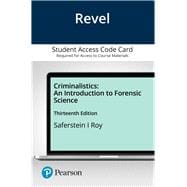For introductory courses in Forensic Science and Crime Scene Investigation
A clear introduction to the technology of the modern crime laboratory for non-scientists
RevelTM Criminalistics: An Introduction to Forensic Science uses clear writing, case studies, and modern technology to reveal the essence of forensic science. The text aims to make the subject of forensic science clear and comprehensible to a wide variety of readers, from future forensic scientists to those curious about the subject. The nature of physical evidence is defined, and the limitations that technology and current knowledge impose on its individualization and characterization are examined. Updated throughout, the 13th Edition includes new information on interpreting blood stain patterns, genotyping, and bite mark comparison.
Revel is Pearson’s newest way of delivering our respected content. Fully digital and highly engaging, Revel replaces the textbook and gives students everything they need for the course. Informed by extensive research on how people read, think, and learn, Revel is an interactive learning environment that enables students to read, practice, and study in one continuous experience – for less than the cost of a traditional textbook.
NOTE: Revel is a fully digital delivery of Pearson content. This ISBN is for the standalone Revel access card. In addition to this access card, you will need a course invite link, provided by your instructor, to register for and use Revel.











